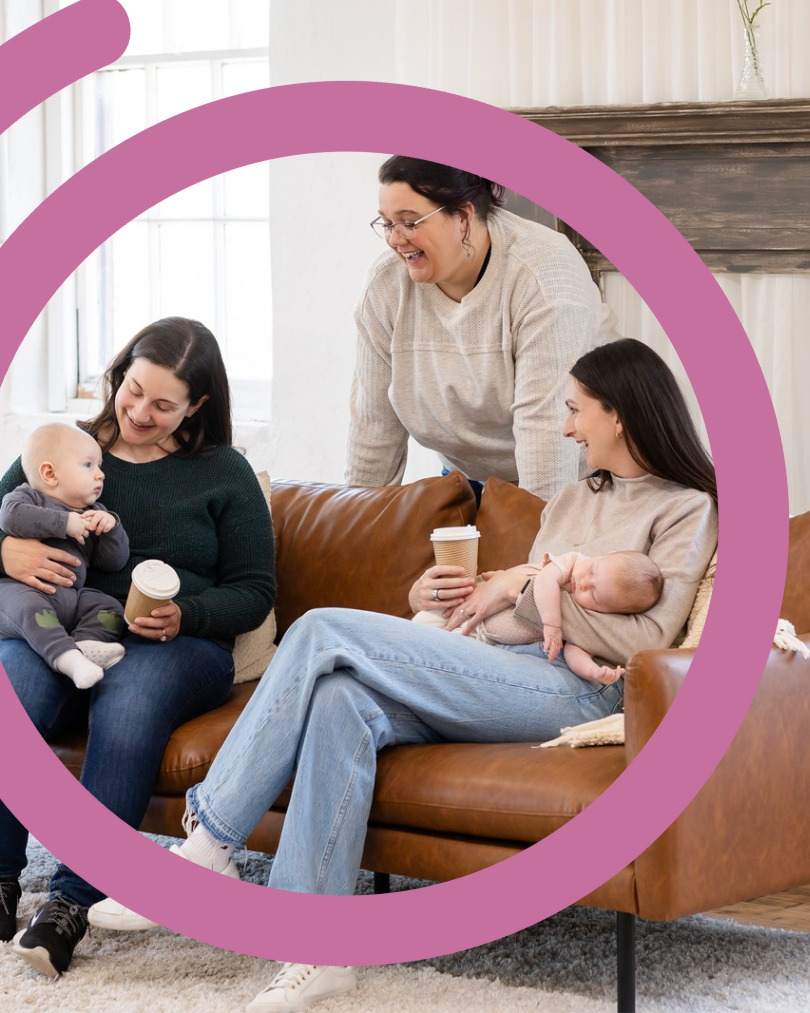Harnessing the Power of Connection to Uplift Families—and Ourselves
By Lisette Weber
When I first started supporting new parents through babywearing meetups and breastfeeding buddy programs, I didn’t have the words “peer support” to describe what we were doing—but that’s exactly what it was. We weren’t experts. We were just people who’d been there, showing up for each other in the messy, unfiltered realities of parenthood.
Now, as a postpartum doula, peer support facilitator, and founder of Nurture & Thrive, I’ve come to believe that peer support isn’t just a “nice-to-have”—it’s the heart of sustainable care. And it doesn’t just help our clients—it helps us, too.
This blog post is a reflection and expansion of a talk I recently gave called Sidekicks Assemble: The Role of Peer Support in Doula Work. Consider this a call to action for all doulas, peer supporters, and care workers to embrace connection as our most powerful tool.

What Even Is Peer Support?
Let’s start with a definition. According to Peer Support Canada:
“Peer support is emotional and practical support between two people who share a common experience, such as a mental health challenge or illness. A Peer Supporter has lived through that similar experience, and is trained to support others.”
It’s a solid definition—but let’s be real. Do you need training to help someone feel less alone? Not always. Peer support happens naturally when we sit beside someone in their hard moment and say, “Me too.” It’s about showing up, not fixing. Listening, not leading. Walking alongside, not ahead.
Why Peer Support Belongs in Doula Work
As doulas, many of us were drawn to this work because we’ve walked a similar path. Maybe we’ve felt isolated postpartum. Navigated infertility. Survived loss. Cared for a dying parent. Our lived experiences aren’t just our backstories—they’re tools for connection.
Here’s how peer support fits in:
- Shared experience builds trust.
- Validation combats shame.
- Community bridges the gaps in care.
- Connection fosters resilience.
I’ve seen this again and again in groups I facilitate, like Nurture & Thrive or the PWO virtual support group. Parents don’t come looking for answers. They come hoping someone will look them in the eye and say, “You’re not broken. You’re not alone.”
Doulas Can’t Do It All—And We’re Not Supposed To
We hold so much for our clients. But we can’t be everything. That’s where peer support comes in—not just for clients, but for us.
Doulas can play a pivotal role in:
- Connecting clients to community.
- Helping them name their support networks.
- Encouraging reciprocal relationships, not just help-seeking.
Building peer support into your practice doesn’t mean more work. Sometimes, it’s as simple as introducing two clients with similar due dates. Starting a group chat. Hosting a casual coffee meetup. Or pointing someone to a drop-in group where they might meet their “person.”
It’s also connecting with other doulas, community resources, and getting your name out there as a source of connection in your community.
Creating Safe Spaces for Peer Support
Whether online or in-person, what makes a space feel safe isn’t fancy branding or expensive snacks—it’s intention. Here’s what works:
- Clear guidelines around confidentiality and respect.
- No pressure to perform. People can share—or not.
- Accessibility matters. Choose inclusive locations, times, and formats.
In Nurture & Thrive, I’ve watched parents come in guarded, unsure, and then slowly open up—because the space allows them to. One parent said after a session, “This is the first time I’ve felt seen in months.” That’s the power of peer support.
Peer Support as a Doula Mindset
This isn’t just a practice. It’s a mindset.
- We’re not the heroes. We’re the sidekicks.
- We don’t need all the answers.
- We’re facilitators, not fixers.
- We can step back so others can step in.
This shift reduces burnout, fosters collaboration, and makes space for community-led care. When doulas stop trying to be everything to everyone, and instead focus on weaving connections, everyone wins.
Let’s Make It Actionable
Here are 3 simple ways to integrate peer support into your practice this week:
- Introduce two clients who might click. That tiny gesture could change their whole postpartum experience.
- Host a no-pressure meetup. Think: BYO coffee in the park or a free library room.
- Do a community scan. What resources exist in your region, who can you connect with, and where can you go to ask questions.
Final Thoughts: We Build Villages
We often say, “It takes a village.” But we forget that villages don’t just appear—they’re built.
And doulas? We’re village builders.
So here’s to less burnout. More connection. And stronger, more supported families—because we chose to show up beside them, not above them.
💜 Sidekicks Assemble.
